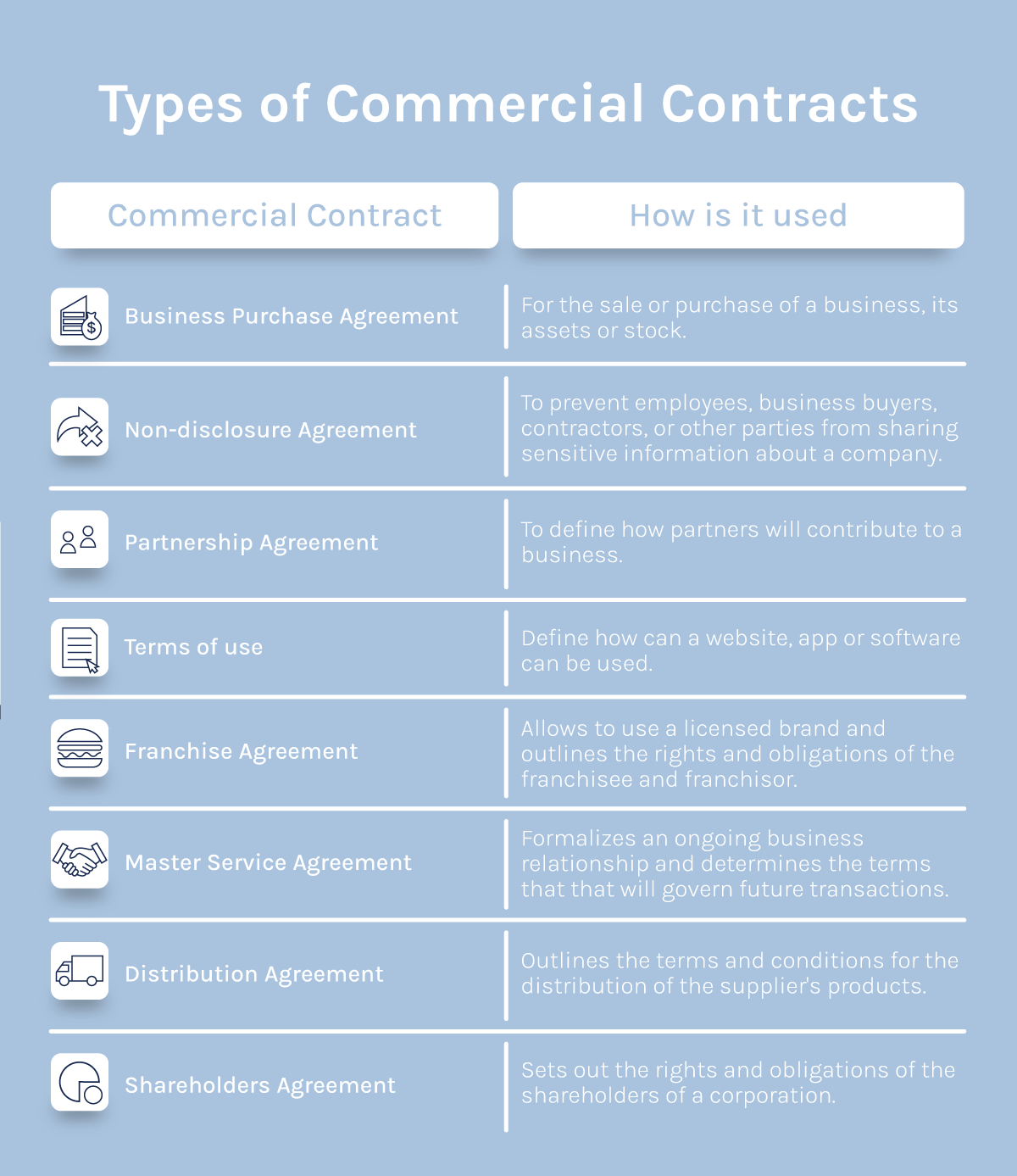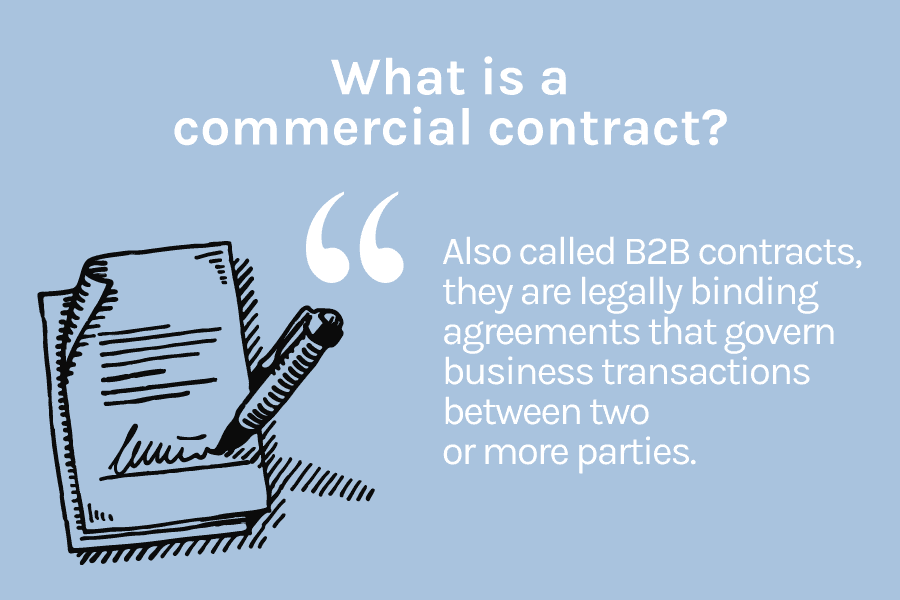What is a commercial contract?
Commercial contracts are legally binding agreements that govern business transactions between two or more parties.
Commercial agreements, also called “B2B” or “business-to-business” contracts, will establish the terms of a business relationship and any commercial activity related to the ones listed below:
- Mergers and acquisitions
- Supply of goods and services
- Sale and distribution agreements
- Franchise agreements
- Trading terms and conditions
These agreements will lay out the terms of the transaction, and include the description of the provided goods or services, the agreed price, and the consequences of not fulfilling the obligations of each.
Although a commercial contract does not have no be in writing to be legally enforceable, the best practice is to have written documentation that you can use as evidence of the deal.
Purpose of commercial contracts
Commercial contracts have the objective of clearly stating the objectives and expectations of a transaction, protecting the interests of the parties, and avoiding potential legal issues.
Any kind of business, regardless of its size, depends heavily on commercial contracts to minimize risk. This is how contracts contribute to the wellness of a company:
- Clearly outline rights and obligations
Drafting a contract is the best way to formalize a commercial relationship and determine the legal obligations parties owe each other. A contract functions as a record of the terms agreed upon and serves as a reference document so those involved in the agreement know the requirements they must meet.
- Protect the interests of the parties
Contracts function as safeguards for businesses, as they minimize the vulnerability of a company’s finances or assets. Commercial contracts help reduce the inherent liability of high-value business transactions and prevent potential losses.
- Prevent disputes and facilitate resolution
The legally binding nature of commercial contracts favors the commitment of the parties toward the transaction. To prevent parties from ending up in court, commercial contracts also state the steps to be taken in the event of a breach or contractual dispute. Commercial lawyers draft contracts to avoid litigation, so typically a dispute will exhaust the arbitration methods, and then proceed to go to court.
Elements of an enforceable commercial contract
As mentioned before, commercial contracts can also be verbal, for their enforceability depends on whether the agreement contains the following criteria:
- Offer: One of the parties makes a promise to do or refrain from doing a specific action in the future.
- Consideration: There is something of value that is going to be given in return for the specified action.
- Acceptance: The expressed consent to the proposed terms
Types of commercial contracts
When used wisely, contracts can strategically increase the growth of a business through collaboration while protecting each party from risks. Commercial contracts can have different objectives and be used in various transactions.

For the sale of goods and services
Business Purchase Agreement
A purchase agreement is used to transfer the assets or shares of a business to a new owner. This commercial contract is used in mergers and acquisitions to specify the conditions of the sale and protect both parties of the business transaction.
Supply of Goods and Services Agreement
Outlines the terms by which goods, products, or services will be provided by a supplier to its customers. Defines how services will be performed, the price to be paid, and the conditions for the completion of these services.
Sale and distribution agreement
Businesses may want to expand into new markets or territories, this is when a distributor agreement comes in. With a distribution agreement, the vendor agrees to buy products from the supplier and sell them in a determined territory.
Software as a Service Agreement
A SaaS agreement is an essential contract for the Information Technology industry. A Technology Lawyer can draft this contract to detail how users can access software and the terms of the subscription and payment.
Terms and Conditions
Any website or app requires to have a ToS contract, in which an online service provider determines the rules users must follow when interacting with one another.
Licensing Agreement
A licensing agreement allows one party, called the licensee to gain access to the property of the owner, called the licensor. By this, a licensee can earn revenue by producing, selling, or using the licensor’s intellectual property.
For cooperation
Partnership Agreement
Outlines the rights and responsibilities that each partner is expected to play in a business. A partnership can be between individuals, between business entities, or between individuals and organizations.
Joint Venture Agreement
In a joint venture, two or more businesses set the governing rules through which they combine their resources for a specific objective.
Franchise Agreement
Under a franchise agreement, a franchisee buys the rights to operate a business using the brands and trademarks granted by the franchisor.
For confidentiality concerns
Non-Disclosure Agreement (NDA)
An NDA is a confidentiality agreement created to protect sensitive information from being leaked to competitors or other parties that may compromise the integrity of a business. They can be used at the beginning of a business relationship, such as an acquisition, or to guarantee the confidentiality of employees.
Structure of a commercial contract
Although each commercial contract is different depending on the objective it pursues, there are common details and clauses that it must contain:
- Details of the parties
The contract outlines the names and basic information of the individuals or organizations that are engaged in the agreement.
- Commencement date
Determines the date that the contract was entered into or when it will become commercially effective
- Deliverables
This is the section of the contract that describes what goods are going to be provided, how they will be delivered, and the payment terms.
- Confidentiality clause
In a business transaction, the parties are likely going to have access to sensitive information, such as the financial performance of the company, or its intellectual property. For this reason, it is key to include a clause that will keep this information secure.
Reps, or representations, are the statements that each party agrees with. They are promises of the current situation regarding the sold goods. On the other side, warranties are the assurance that the product is free from defects.
- Dispute resolution
Agreeing on how to solve disputes in advance can help parties have a smoother avoid a tortuous process Outlines how will parties proceed in the event of a conflict to avoid litigation.
- Termination
Defines the circumstances under which the parties have the right to end the contract and free themselves from any obligations.
- Damages
If a Defines the compensation that a trespasser owes due to the damages caused for the failure to perform
- Limitation of liability
Transactions have a high value, which also comes with great responsibility. Contracts typically include a clause that limits the extent to which they can be held liable for certain eventualities.
- Jurisdiction
Businesses can engage in cross-border transactions, or the parties may be located in two different states. For this reason, the contract must specify the governing laws that apply to the contract.
- Force Majeure
This provision covers the impact of external situations, such as natural disasters, terrorism, or other uncontrollable acts that caused the non-compliance of the contract.
- Signatures
By including this form of identification, parties express their consent to entering the commercial deal.
What laws govern commercial contracts?
The validity of a contract also depends on the law that governs them. There are three different laws that govern commercial contracts:
- Common Law: Refers to the compilation of case law that has been formed over the years. To understand these laws, you have to review what the courts have ruled in specific situations. This type of law is ever-changing as long as courts are ruling on those different situations.
- Uniform Commercial Code (UCC): The law that is specific to goods for the sale of $500 or more and usually governs the transactions between merchants.
- Miscellaneous laws: Refers to other statutes that are more regulatory to cover a specific issue. One example is the law regulating contracts and how contracts can and cannot automatically renew for consumers. Another example is the Statute of Frauds which requires certain contracts to be in writing, which governs contracts that have a term of more than a year, or involve the sale of goods for more than $500, or contracts involving real estate.
What does a commercial contract lawyer do?
A commercial law attorney helps individuals and organizations that are engaged in business transactions to ensure a fair deal and reduce liabilities. A commercial lawyer offers legal advice to companies and helps them by:
- Drafting, negotiating, and reviewing contracts.
- Assessing parties that are involved in mergers and acquisitions and conducting due diligence.
- Protecting their intellectual property
- Preventing business disputes and legal issues
- Ensuring the compliance of a business by setting up the required legal documents
Commercial contract drafting
A commercial contract can help a business build strong relationships and boost the efficiency of a company. It facilitates internal and external cooperation and can help generate more revenue. However, a mishandled contract can severely impact the finances of a company and even lead to litigation. For this reason, a commercial lawyer must take care of the business transactions of a company, regardless of its size.
Our commercial lawyers at Motiva Business Law can help you carefully draft your contracts and review them to ensure you’re entering a beneficial deal.


